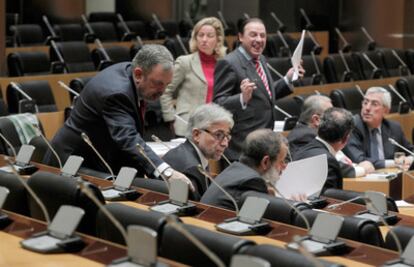"Sinde law" will pass, say Socialists
Government claims Congress majority supports aims of failed anti-download bill
Two days after the controversial "Sinde law" on illegal internet downloads failed to obtain sufficient congressional support, the government was saying it would try to get it passed again.
"There is no self-respecting country in the world that can afford not to protect intellectual rights," said Deputy Prime Minister Alfredo P¨¦rez Rubalcaba following a Cabinet meeting on Thursday. "Let's see if out of this congressional defeat - which it was - we can manage to raise a consensus - which there is - to protect our intellectual property."
His words were an endorsement of Culture Minister ?ngeles Gonz¨¢lez-Sinde, whom the initiative is informally named for, and who denied she would step down after her proposal was shot down in Congress.
"No country can afford not to protect intellectual rights," said the deputy PM
Nobody wants to accept the electoral cost of an unpopular proposal
"The government is fully convinced and committed to intellectual property rights; it is essential to the economic development of our cultural industry," she said on Tuesday. When a journalist asked her if she was planning to resign, she quipped: "No, are you?"
Rubalcaba added that "there is a parliamentary majority in favor of the goal defended by Minister Sinde's law, which is none other than fighting online piracy."
The legislation, which was meant to be part of a larger bill called the Sustainable Economy Law, proposed closing down websites that enabled free downloads of copyrighted material such as movies or music. Despite frenzied negotiations with the conservative Popular Party (PP) and the CiU Catalan nationalists, the ruling Socialists failed to raise support for the measure. The Sustainable Economy Law will now move to the Senate stripped of the section about intellectual copyright protection on the internet.
Still, the Socialists hold that all parties agree with the gist of the law, and that the only reason they held back support was to avoid looking like allies of an initiative that has garnered intense criticism in internet forums.
"Over the next few days we will try to rebuild a consensus that we did not reach in past weeks, because at the heart of the issue there is a basic agreement over whether piracy should be permitted or not. The answer from all parliamentary groups is no," said Rubalcaba, adding that the government would now see "which is the right legal instrument" to fight piracy more efficiently.
"We will try again and if we are skillful, which we are, we will push this forward." The problem, said Rubalcaba, is that "there were groups who wanted to go further than the government, and others who wanted to do less. And there were others who simply never want to lend a hand, even if they agree with what we want to do," he added, in a thinly veiled reference to the main opposition Popular Party.
Vocal protest from internet groups that oppose the Sinde law made it difficult for political parties to back the government, since nobody wants to accept the electoral cost of an unpopular proposal with a view to next year's local and regional elections. Last Sunday, highly popular download webs such as Series Yonkis and Cinetube, shut themselves down for 24 hours in protest over the measure, and earlier this week several internet forums encouraged denial-of-service attacks which took place against the websites of Congress and of political parties including the Socialists, the PP, the Basque nationalists of PNV and the Catalan nationalists of CiU.
Rubalcaba underscored that "the law is balanced compared with British, French or US legislation," and that it does not criminalize people who download a book or a movie, but simply prevents piracy.
"This is not about persecuting anyone; we are not violating anybody's freedom of expression. We are simply trying to regulate the ownership of people who create in Spain."
Key to getting the law back on track, say Socialists, will be further dialogue with the CiU. The Catalan bloc supports the closure of websites that offer unauthorized copyrighted material for download. However, it failed to vote for it on Tuesday because in the against-the-clock negotiations earlier last week it made economic demands the Socialists were unwilling to grant.
After discussion with CiU leaders, Socialist deputies now believe the Catalan group would support the law with just a few light corrections in the original text to reinforce the judicial and administrative process with new guarantees. These revolve around the nature of the members of the proposed Intellectual Property Commission - it is essential for the CiU that the commission's impartiality be demonstrated - the introduction of a mediation and arbitration commission; and the increasing by a few days of the maximum deadline for the High Court to decide whether to agree with the Commission's request to shut down a website. Last Thursday's investiture of the CiU's Artur Mas as Catalan premier following the abstention of Catalan Socialists will no doubt offer hope for such an agreement.
Culture Minister Sinde told EL PA?S she is confident that there will be a version of the law bearing her name. "Trust that there will," she said. "I hope that it will look a lot like the model proposed by the government. I find it fairly balanced.
"It cannot end up too watered down. The time period, for example, is important because [illegal downloading] is a massive violation that pays no attention to borders. Time periods are very short for the launching of a record, a film or an electronic book... It cannot be postponed for years."
But when asked about the possibility of a making a pact over the matter of judicial control, the minister reacted coldly. "The judicial control of our bill is at the maximum," Sinde said. "I don't know why there need to be more judges." And a pact over an arbitration commission? "If people want to put matters that should be in another intellectual property law into this law and there is a parliamentary consensus, they can put them in," she said.

"Now they hug the robber"
The culture industry seemed disoriented following last Tuesday's congressional defeat of the Sinde law. A survey of around 20 musicians, filmmakers, producers, actors, writers and philosophers evidenced a widespread feeling of indignation over "a direct aggression that breaks the rule of law," in the words of film producer Agust¨ªn Almod¨®var, brother of director Pedro Almod¨®var.
The writer Fernando Savater said "the clumsiness of a government that introduces this piece of legislation as a mere clause of a generic law and the deplorable spectacle of all groups voting against it" caused him to feel "shame and desolation."
Meanwhile, writing in EL PA?S, the singer Alejandro Sanz accused politicians of acting in a cowardly and hypocritical way. "I think many of them, despite knowing the law was fair, voted against it for their own benefit or due to cowardice," he said.
"Here piracy is protected [...]; here they voted to protect the right of the pirate to keep his musical brothel open and they voted against the artist... and our rights... Do you know how many jobs have been lost in music because of the [internet] Taliban and their accomplices?"
Also writing in EL PA?S, actor Javier Bardem expressed similar concern for those working behind the scenes in the film industry. "Now there is no law protecting those who have been robbed. Now they hug the robber."
One group, the Creators Platform for Copyright, has circulated via email a nine-point manifesto outlining its position in relation to the Sinde law rejected by Congress. The manifesto is signed by 150 names from the cultural world, including Savater, writer and filmmaker Vicente Molina Foix and the author Enrique Vila Matas.
"We demand the government, political parties and the media do not succumb to the temptation of populism on this issue," it reads.
Tu suscripci¨®n se est¨¢ usando en otro dispositivo
?Quieres a?adir otro usuario a tu suscripci¨®n?
Si contin¨²as leyendo en este dispositivo, no se podr¨¢ leer en el otro.
FlechaTu suscripci¨®n se est¨¢ usando en otro dispositivo y solo puedes acceder a EL PA?S desde un dispositivo a la vez.
Si quieres compartir tu cuenta, cambia tu suscripci¨®n a la modalidad Premium, as¨ª podr¨¢s a?adir otro usuario. Cada uno acceder¨¢ con su propia cuenta de email, lo que os permitir¨¢ personalizar vuestra experiencia en EL PA?S.
?Tienes una suscripci¨®n de empresa? Accede aqu¨ª para contratar m¨¢s cuentas.
En el caso de no saber qui¨¦n est¨¢ usando tu cuenta, te recomendamos cambiar tu contrase?a aqu¨ª.
Si decides continuar compartiendo tu cuenta, este mensaje se mostrar¨¢ en tu dispositivo y en el de la otra persona que est¨¢ usando tu cuenta de forma indefinida, afectando a tu experiencia de lectura. Puedes consultar aqu¨ª los t¨¦rminos y condiciones de la suscripci¨®n digital.




























































